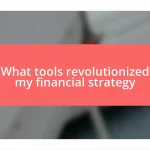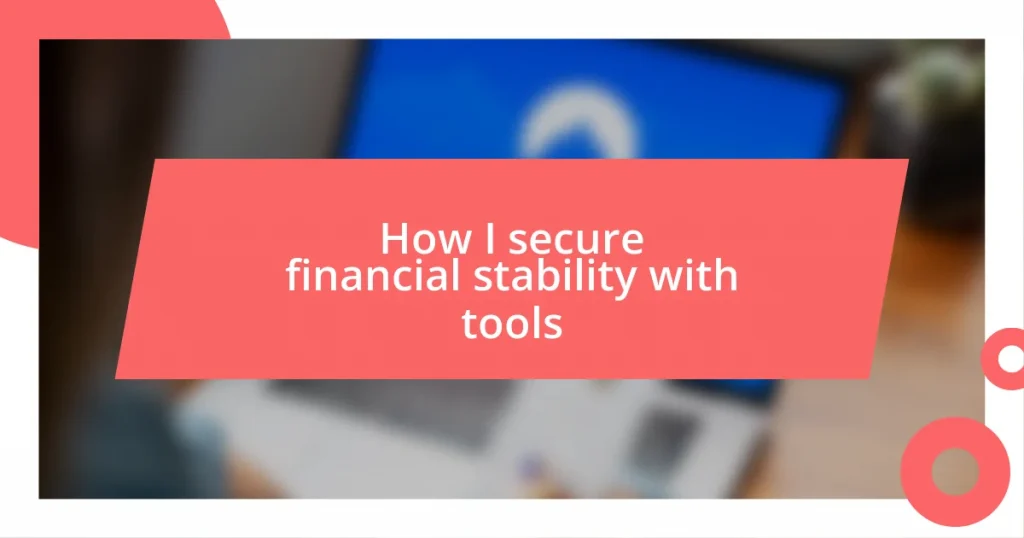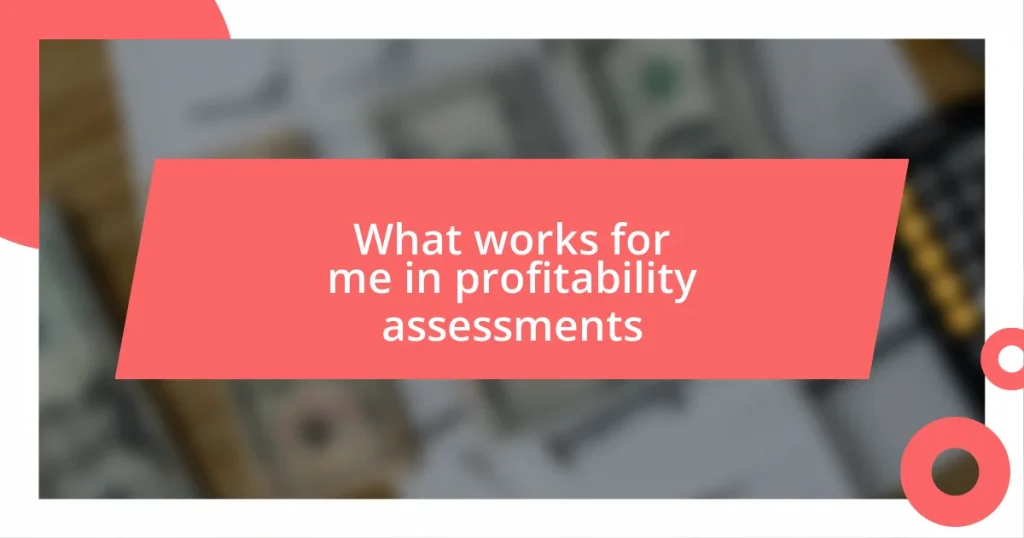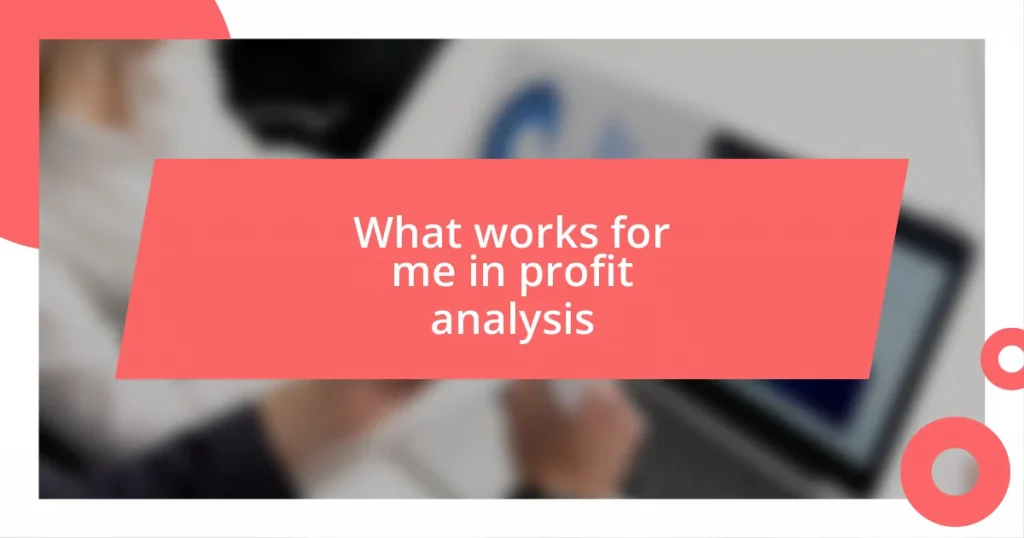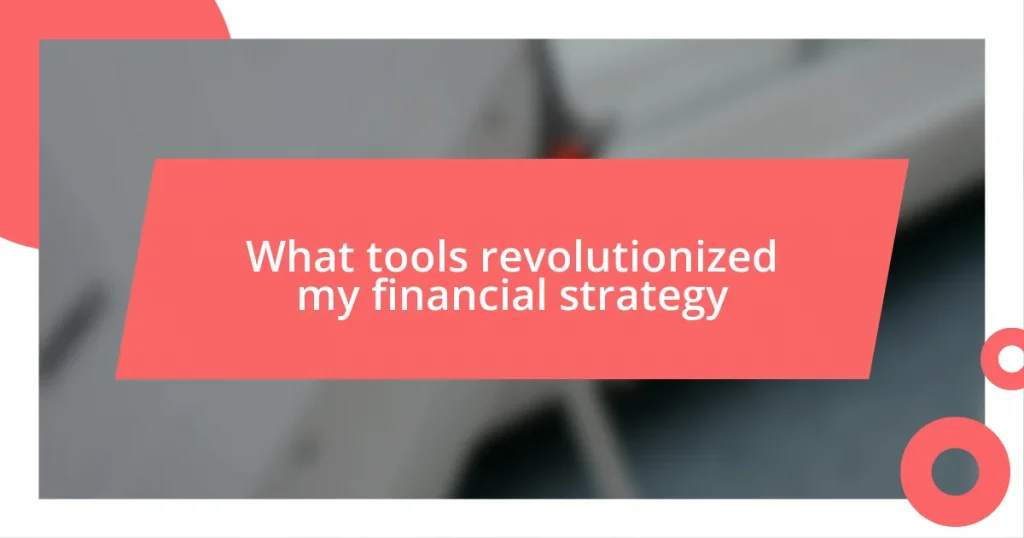Key takeaways:
- Diversifying income sources and having an emergency fund enhances financial stability and security against unexpected expenses.
- Utilizing budgeting and financial tools, such as apps for tracking expenses and savings, can simplify financial management and promote discipline.
- Regularly tracking financial progress enables goal adjustment and fosters a proactive approach to achieving financial objectives.
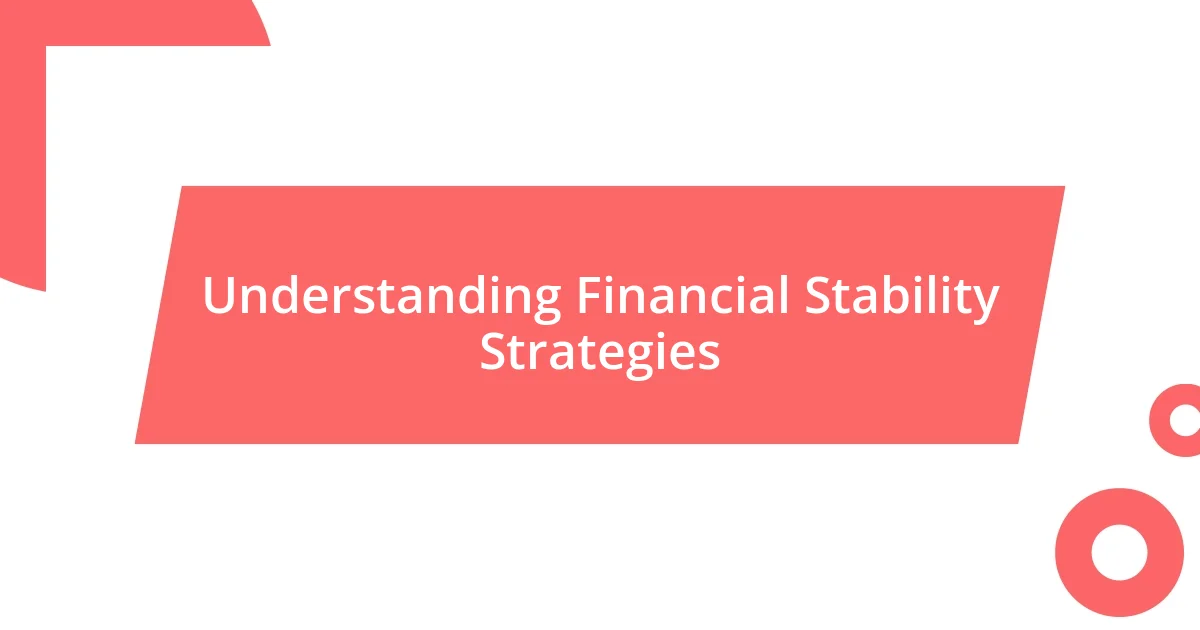
Understanding Financial Stability Strategies
Understanding financial stability strategies goes beyond just number crunching; it’s about creating a holistic plan that aligns with your goals. For instance, when I first started budgeting, I didn’t realize how tracking my spending could illuminate hidden patterns. Have you ever noticed how that daily coffee habit adds up over time? Identifying these habits can be an eye-opener, allowing for informed adjustments that foster stability.
A crucial strategy I’ve found is diversifying income sources. Several years ago, I took the leap of faith to explore freelance work alongside my 9-5 job. While it initially felt overwhelming, the extra money not only provided a cushion during unexpected expenses but also gave me a sense of security that I hadn’t experienced before. How would you feel knowing that, come what may, you have multiple revenue streams backing you up?
Moreover, the importance of having an emergency fund cannot be overstated. I recall facing a car repair unexpectedly, and having that financial buffer felt like a safety net. It transformed what could have been a stressful situation into a manageable one. Isn’t it reassuring to know that you can navigate life’s surprises without derailing your financial plan? Embracing strategies like these has personally shaped my understanding of financial stability into a proactive, empowering journey.
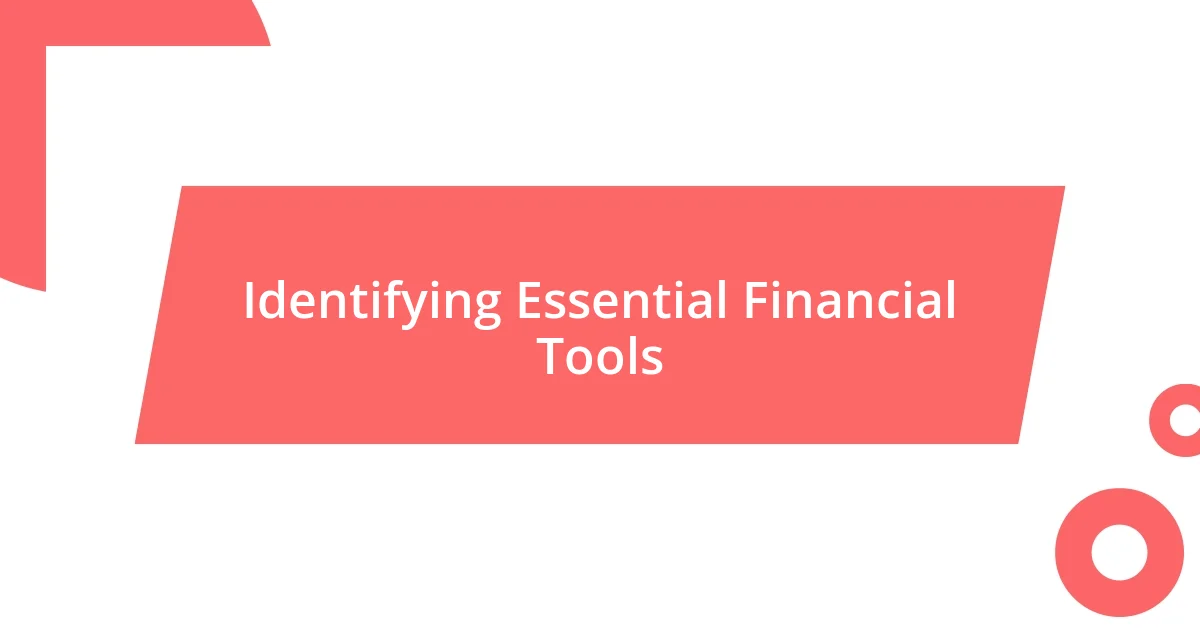
Identifying Essential Financial Tools
Identifying the right financial tools can significantly impact your journey toward stability. I remember when I stumbled upon budgeting apps—at first, I thought they were just gimmicks. However, downloading one kept me on track, allowing me to visualize my finances in a way I never could before. It felt like gaining a superpower, tracking my savings goals and spending habits effortlessly.
Here are some essential financial tools I believe everyone should consider incorporating into their financial toolkit:
- Budgeting Apps: These simplify tracking income and expenses, making it easier to understand your financial habits.
- Investment Platforms: Investing early can create substantial growth over time, so finding user-friendly platforms is key.
- Expense Trackers: Use tools to categorize spending and identify areas for improvement.
- Savings Calculators: These can help you set realistic savings goals and project future earnings.
- Financial Education Resources: Books, podcasts, and webinars can provide invaluable insights for informed decision-making.
By integrating these tools, I’ve not only streamlined my financial management but also gained peace of mind knowing I’m equipped to face whatever life throws my way.
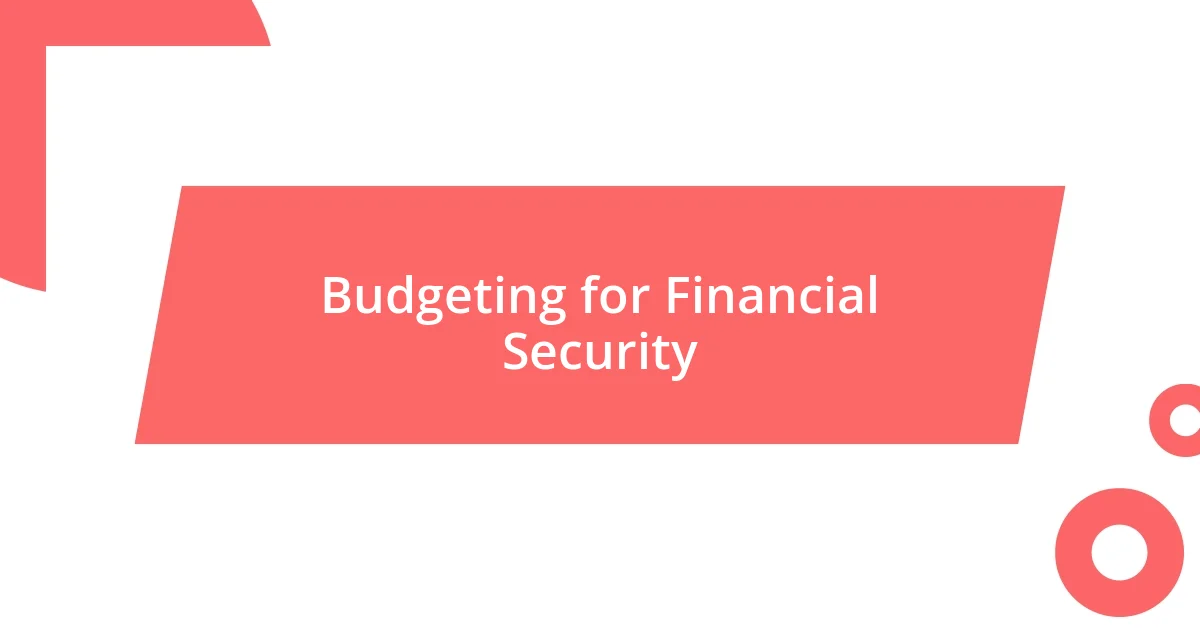
Budgeting for Financial Security
Budgeting for financial security starts with understanding where your money is going. When I first tried to budget, I felt overwhelmed by all the numbers and categories. But it turned out that simply breaking my spending into essential and discretionary categories made a world of difference. Now, I can see exactly where I can cut back—all while still enjoying the little pleasures in life, like that occasional dinner out with friends.
I’ve found that setting clear financial goals is crucial. For example, I decided to save for a vacation, and by allocating a specific amount each month towards that goal, I not only felt motivated but actually achieved it. It’s amazing how having a target keeps me focused. Have you ever aimed for something specific and found the path to get there clearer?
Tracking my progress has also been game-changing. I use a simple spreadsheet where I log my expenses and income weekly, which provides me with a quick snapshot of my financial health. When I see that my savings are steadily increasing, it brings a sense of accomplishment that can’t be beaten. This reinforces the habit and encourages me to maintain discipline with my finances, leading to greater peace of mind.
| Budgeting Approach | Benefits |
|---|---|
| Zero-Based Budgeting | Every dollar is assigned a job, helping to eliminate wasteful spending. |
| 50/30/20 Rule | A straightforward method: 50% for needs, 30% for wants, and 20% for savings. |
| Envelope System | This physical method keeps spending in check by enforcing cash limit for each category. |
| Prioritizing Essentials | Ensures that necessities are covered first, promoting financial security. |
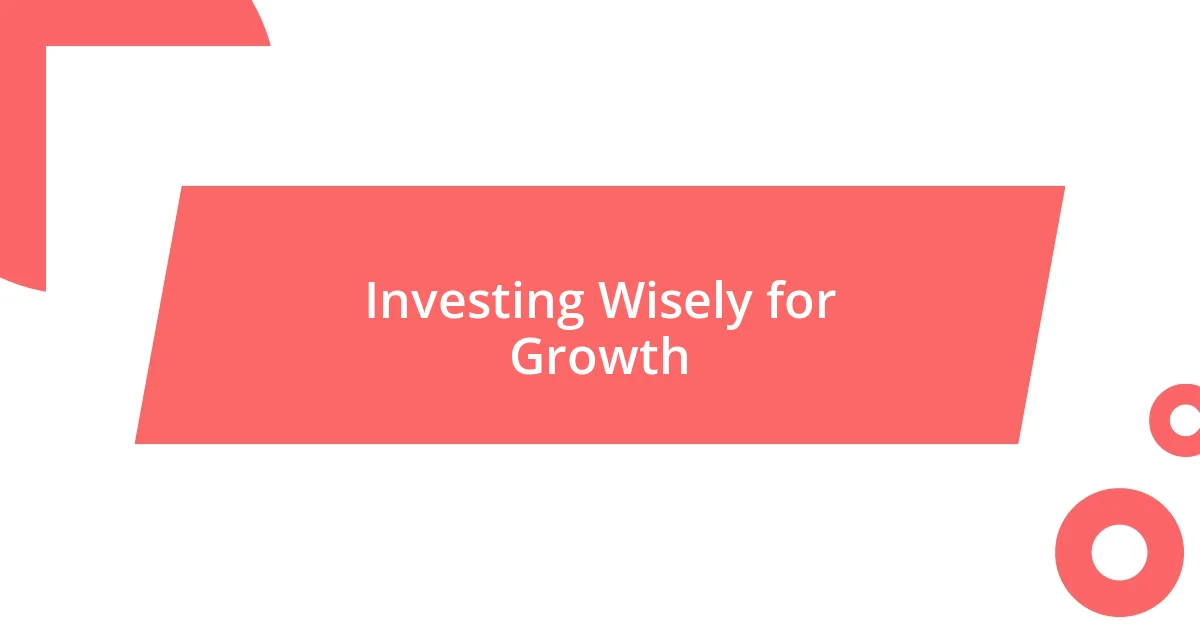
Investing Wisely for Growth
Investing wisely is about more than just throwing money at stocks or bonds; it’s about forming a strategy that aligns with your financial goals. I learned this the hard way when I hurriedly bought into a popular tech stock without understanding its fundamentals. The thrill quickly faded as I watched the market fluctuate, and I realized I should have done proper research. So, what does “investing wisely” truly mean? For me, it means taking time to analyze potential investments, ensuring they match both my risk tolerance and my long-term objectives.
One of my favorite investment strategies is dollar-cost averaging. It sounds complex, but it’s rather straightforward: I invest a fixed amount regularly, irrespective of the market’s ups and downs. This method has not only reduced my anxiety over market timing but also allowed me to buy more shares when prices dip, ultimately lowering my average cost. Doesn’t that sound comforting? Knowing you’re consistently working towards growth, regardless of market volatility, can lighten the financial stress many feel.
Additionally, I always invest in what I understand. For instance, I’ve chosen to focus on sustainable companies because I’m passionate about the environment. This personal connection makes the investment journey much more fulfilling. I often wonder, aren’t we more motivated to support causes that resonate with our values? By aligning my investments with my beliefs, I not only work toward financial growth but also contribute to a future I genuinely care about.
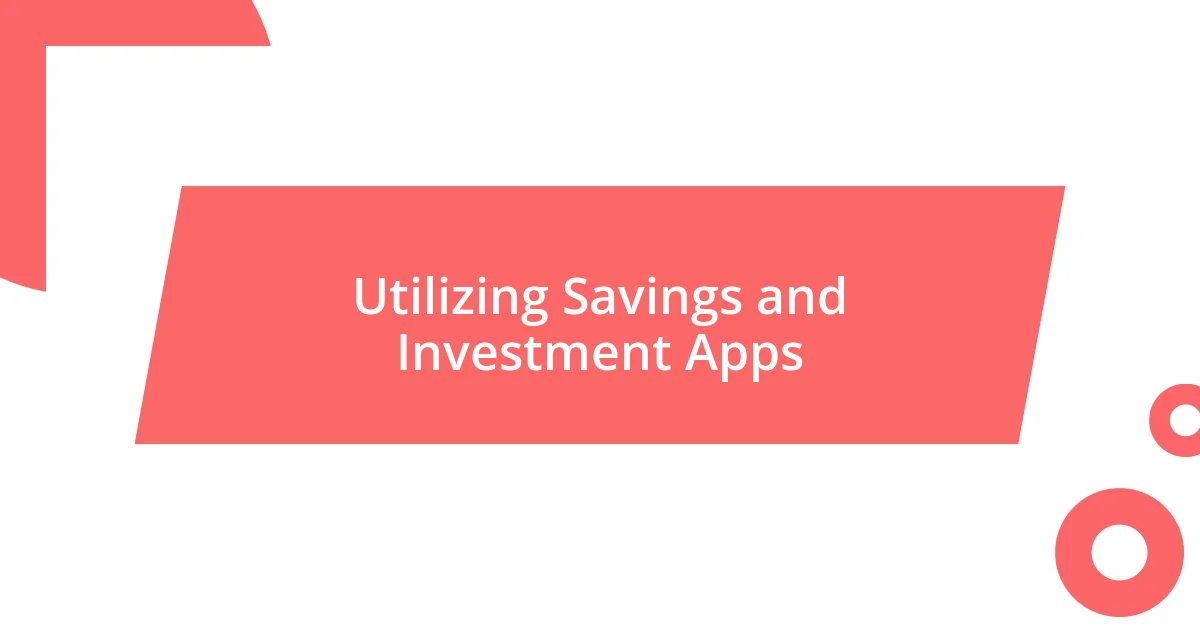
Utilizing Savings and Investment Apps
Savings and investment apps have transformed how I approach managing my finances. When I stumbled upon my first savings app, I was amazed by its user-friendly interface that made tracking my goals feel less daunting. The instant gratification of seeing my savings grow in real-time motivated me to save more. Isn’t it incredible how technology can turn saving into a game?
As I dove deeper into investment apps, the learning curve was definitely present, but I embraced the challenge. I remember my initial hesitation about investing in stocks; it felt overwhelming. However, these apps offered educational resources that guided me through the basics. Now, I feel empowered to make informed decisions, and I find myself eagerly researching and exploring different assets. Have you ever felt that rush of knowledge turning confusion into confidence?
The benefit of using savings and investment apps extends beyond just tracking finances; they help cultivate a healthier financial mindset. I appreciate features like automatic transfers to savings and investment accounts, which have turned saving into a seamless habit for me. It’s like having a financial coach in my pocket! Now, I rarely miss those allocations, and seeing my money grow is not just a number—it’s a step toward my dreams. How have tools like these changed the way you view savings?
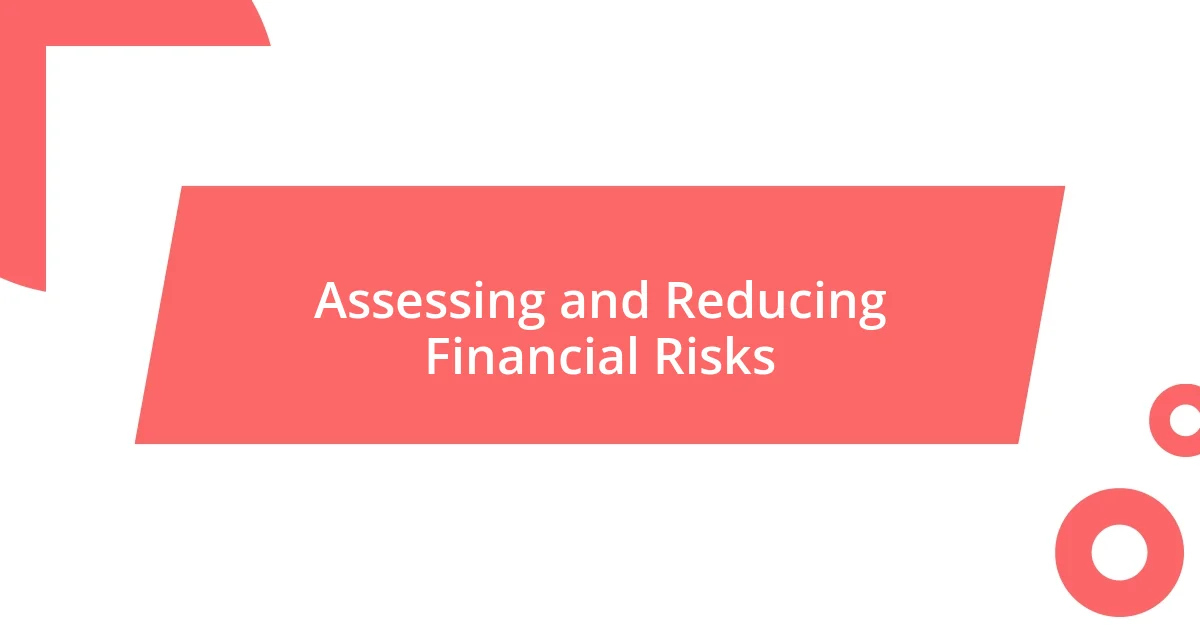
Assessing and Reducing Financial Risks
When it comes to assessing financial risks, I’ve learned the value of creating a detailed budget. Early on, I overlooked how spending patterns could affect my financial health, which led to some uncomfortable surprises at the end of the month. By tracking my income and expenses, I not only pinpoint potential pitfalls but also gain clarity on where I can tighten my belt. Isn’t it surprising how many hidden costs we overlook in our daily lives?
To further reduce risks, I also focus on building an emergency fund. Initially, I hesitated to divert money from my investments, fearing I’d miss out on growth. However, I quickly realized having a safety net of three to six months’ worth of living expenses provides immense peace of mind. It’s like having a shield against life’s unforeseen events—whether it’s a medical emergency or a job loss, knowing I’m covered is incredibly reassuring. Have you experienced that anxiety before an unexpected bill arrives?
Diversification is another crucial tool in my financial risk management arsenal. I vividly recall a time when my portfolio was heavily weighted in one sector. It was a rude awakening when that industry faced a downturn. Now, I make it a priority to spread investments across different assets and sectors, which not only stabilizes my returns but also allows me to sleep soundly at night. Doesn’t it feel great to know you’ve taken steps to shield your hard-earned money from volatility?
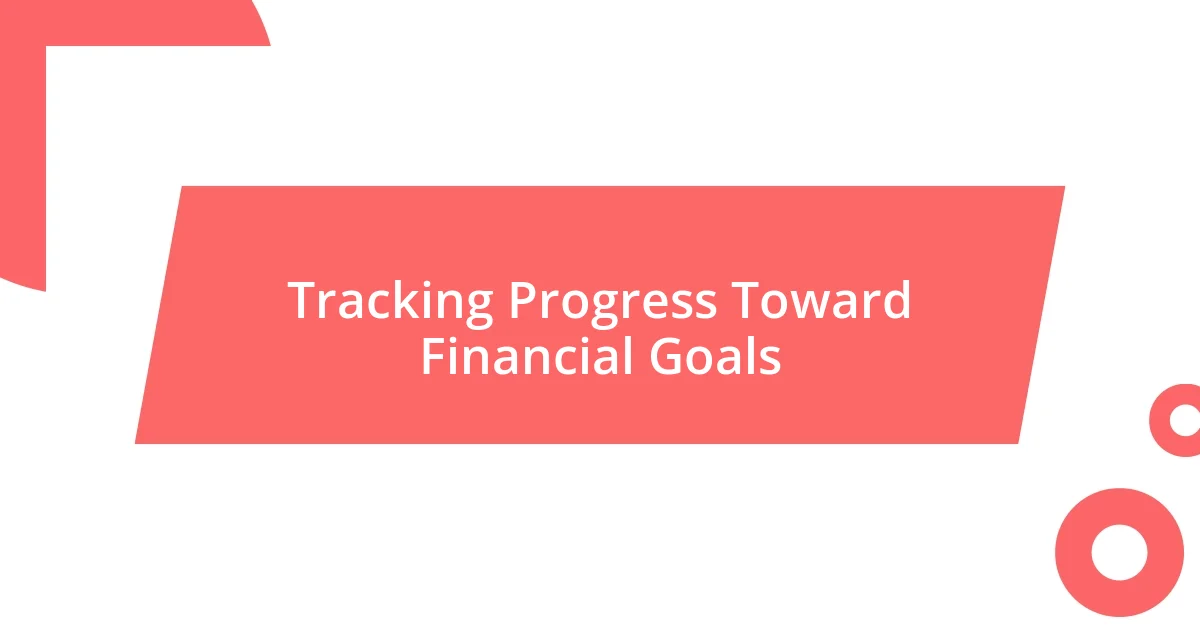
Tracking Progress Toward Financial Goals
Tracking progress toward my financial goals has become a rewarding habit that brings me a sense of accomplishment. I remember the thrill of logging into my savings app each month, viewing my progress like a scoreboard. Seeing those numbers climb gave me a spark of motivation that made budgeting feel like a game rather than a chore. Have you ever felt excited by small wins that lead to bigger ones?
I also find that setting specific milestones keeps my focus sharp. For instance, I aim to save a certain percentage of my income each quarter. When I reach that benchmark, it’s a cause for celebration! This practice not only reinforces my discipline but also allows me to reflect on how far I’ve come. Have you ever taken a moment to celebrate your financial achievements, no matter how small?
The added benefit of tracking progress means I can adjust my goals based on changing circumstances. I distinctly recall a time when unexpected expenses arose, and I had to reassess my saving strategies. By regularly reviewing my financial situation, I was able to pivot and find new ways to stay on track. It’s empowering to know that I can adapt my plan while still keeping my eyes on the prize. How do you stay flexible in the face of financial challenges?


